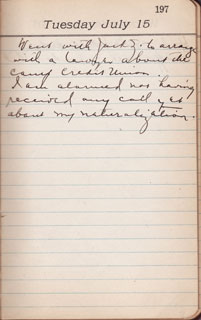
Maccabean Meeting
Paid 2nd installment of $5.00
on my pledge for the K.H.
————
Matt’s Notes
Papa was Master of Ceremonies of the “Maccabeans,” his local chapter of the Jewish fraternal organization B’nai Zion, so he frequently attended their meetings and reported them in an offhand way. “K.H” refers to Keren Hayesod, the Zionist fundraising organization to which Papa had pledged a donation several weeks earlier.
Interestingly, while I was searching the Library of Congress Web site for a picture of a baby’s cradle to use on yesterday’s post, I stumbled across a photo of a nursery in a 1920’s Jewish settlement in Palestine labeled “The Keren Hayesod. Agricultural colonies on Plain of Esdraelon…A baby in a crib.”
There are other Keren Hayesod images there, too:

A family standing outside a house, a communal dining room, a spare, dusty settlement. Had Papa seen slides of such photos at the lectures he attended, passed them around at “Maccabean” meetings, or clipped them out of the Yiddish dailies he read? Were these the images in his mind when he sent $5 he couldn’t afford to Keren Hayesod?
————-
Image sources:
The Keren Hayesod. Agricultural colonies on Plain of Esdraelon. “The Emek.” Ein Harod. The baby creche. A baby in a crib.: Library of Congress # LC-M32- 3220
The Keren Hayesod. Agricultural colonies on Plain of Esdraelon. “The Emek.” Kafr Yeladim. Formerly “the childrens’ colony.”: Library of Congress # LC-M32- 3205
The Keren Hayesod. Agricultural colonies on Plain of Esdraelon. “The Emek.” Ein Harod. Communal dining room: Library of Congress # LC-M32- 3217
The Keren Hayesod. Agricultural colonies on Plain of Esdraelon. “The Emek.” Afouleh. One of the earlier colonies: Library of Congress # LC-M32- 3202











